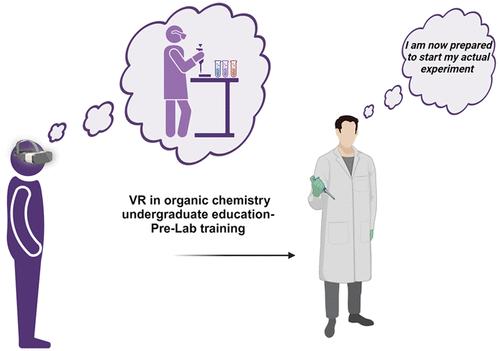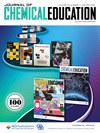虚拟现实技术在生态型本科有机化学实验课程中的应用:化学实验教学的新实践
IF 2.5
3区 教育学
Q2 CHEMISTRY, MULTIDISCIPLINARY
引用次数: 0
摘要
虚拟现实(VR)工具越来越受到科学教育工作者的关注。然而,对 VR 教育效果的评估,尤其是在生态环境和基于实验室的本科生实践教育(如化学)中的评估,仍然十分有限。在本研究中,我们报告了在本科一年级学生的有机化学入门课程中将 VR 作为实验室预培训活动的实施情况。我们为丹麦罗斯基勒大学跨学科学习的学生(n = 59)开发了一种 VR 一体化教学实践。研究程序包括:(i) 前测;(ii) 在 VR 模拟中进行虚拟实验以确定有机反应;(iii) 选定有机反应的真实实验室实验;(iv) 后测。为了调查学习成果,我们收集并分析了调查数据的可靠性以及在认知和情感学习方面的统计收益。我们发现,使用 VR 模拟作为预培训教学工具,提高了学生对有机化学实验练习的整体认知参与度。虽然学生的内在动机和自我效能感没有明显提高,但他们在干预后的感知学习得分却相当高。然而,在生态学/生态学实验课程中实施虚拟现实预培训干预非常复杂,涉及到一些技术和教学限制,值得进一步关注。本文章由计算机程序翻译,如有差异,请以英文原文为准。

Virtual Reality in an Eco-Niche Undergraduate Organic Chemistry Laboratory Course: New Practice in Chemistry Lab Teaching
Virtual reality (VR) tools are gaining attention among science educators. However, evaluations of VR’s educational effectiveness, particularly in ecological settings and hands-on lab-based undergraduate education (e.g., chemistry), remain limited. In this study, we report our efforts to implement VR as a laboratory pretraining activity in an introductory Organic Chemistry for first year undergraduate students. We developed a VR-integrated pedagogical practice for students (n = 59) enrolled in interdisciplinary studies at Roskilde University Denmark. The study procedure involved (i) a pretest, (ii) a virtual experiment to identify organic reactions performed in a VR simulation, (iii) a real lab experiment of selected organic reactions, and (iv) a post-test. To investigate learning outcomes, survey data were collected and analyzed for reliability and statistical gains across several cognitive and affective aspects of learning. We found that using VR simulations as a pretraining teaching tool improved students’ overall cognitive engagement with organic chemistry lab exercises. While there was no significant increase in students’ intrinsic motivation and self-efficacy, their post-intervention perceived learning scores were quite high. However, implementing VR pretraining intervention in ecological/niche lab courses is complex and involves several technical and pedagogical limitations that warrant further attention.
求助全文
通过发布文献求助,成功后即可免费获取论文全文。
去求助
来源期刊

Journal of Chemical Education
化学-化学综合
CiteScore
5.60
自引率
50.00%
发文量
465
审稿时长
6.5 months
期刊介绍:
The Journal of Chemical Education is the official journal of the Division of Chemical Education of the American Chemical Society, co-published with the American Chemical Society Publications Division. Launched in 1924, the Journal of Chemical Education is the world’s premier chemical education journal. The Journal publishes peer-reviewed articles and related information as a resource to those in the field of chemical education and to those institutions that serve them. JCE typically addresses chemical content, activities, laboratory experiments, instructional methods, and pedagogies. The Journal serves as a means of communication among people across the world who are interested in the teaching and learning of chemistry. This includes instructors of chemistry from middle school through graduate school, professional staff who support these teaching activities, as well as some scientists in commerce, industry, and government.
 求助内容:
求助内容: 应助结果提醒方式:
应助结果提醒方式:


